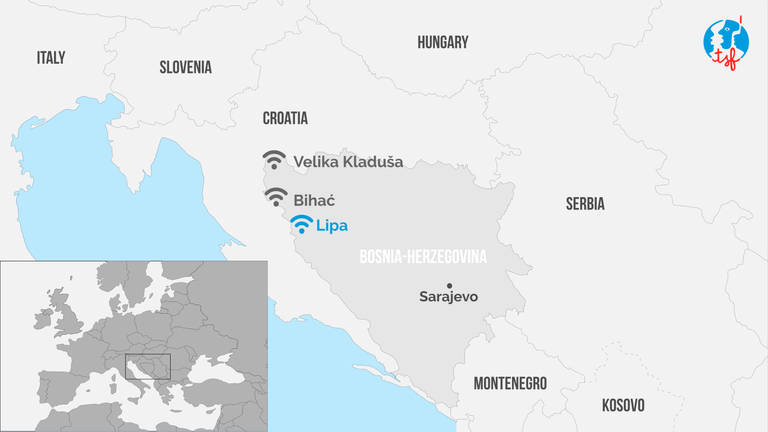Balkan Migration Crisis
Context: Migrant Crisis
Start date: 01/11/2018
End date: ongoing
Areas of intervention: Lipa, Bihać, Velika Kladusa
Activities:
- Connectivity for populations
- Support to humanitarian coordination
Lipa
+8,000 unique devices connected
+61 TB of data exchanged
12 High Density Wi-Fi access points
Bira
17 890+ devices connected since November 2018
~18.94 TB of data exchanged / month
15+ organisations supported
50+ humanitarian actors
Context
Since the beginning of 2018, more than 87,000 refugees and migrants arrived in Bosnia and Herzegovina. In 2022, the number of asylum seekers in the European Union has reached a high level, especially in countries along the Balkan route. According to the United Nations High Commissioner for Refugees (UNHCR), there are currently up to 7,200 migrants in the country.
As migrants and refugees try to reach their destination across the border in Northwest Bosnia to enter Croatia, their journeys is complicated by increased checks and deportations. In addition to their already-precarious situation, asylum seekers and refugees arriving in Bosnia have great difficulty contacting their families due to a lack of connectivity equipment and financial means.
In October 2018, the International Organization for Migration (IOM) opened a center for migrants at the Bira factory in Bihać. In 2021 the factory shelter closed and the refugees were transferred in the camp of Lipa, 25 km South from Bihać.

Our mission
Since December 2021, TSF is conducting - with the support of IOM - a Wi-Fi coverage in Lipa refugee camp. In 2022, TSF extended the Wi-Fi coverage of the Lipa camp to newly built sections. Since then, 12 High Density Wi-Fi access points are still available, allowing refugees hosted in the camp to maintain a link with their relatives and have access to important information.
This project aims at easing the relationships between migrants, refugees and the local community, by offering an internet connection with WI-FI access, allowing individuals to stay connected with their loved ones.
Providing connectivity to refugees
Today, connectivity is an essential need for refugees. The internet connection installed by TSF in the Lipa camp is offering a free link to the outside world to people who have been living in harsh conditions for months, or even years. It allows migrants, refugees and asylum seekers to stay in close contact with their families.
In addition to enhance their psychological well-being, connectivity allows them to have access to important information regarding their situation and to find opportunities for their future.
To learn more about the benefits of connectivity for refugees, read our newsletter.
Connectivity in Bira factory (2018-2021)
Before the closing of the Bira factory in 2021, TSF collaborated on a project with IOM, which aimed at providing means of communication to migrants and refugees in the center of Bira - as well as humanitarian NGOs who used to work there.
The project benefited to 50 local and international humanitarian actors from different organizations such as IOM, the United Nations Refugee Agency (UNHCR), Médecins Sans Frontières (MSF), the Jesuit Refugee Service (JRS) and the Red Cross.
For the same reason, TSF was also present at Velika Kladusa until June 2019 to provide the necessary connection to other humanitarian actors working on-site.
Testimonies
"When you're alone, there's no one to talk to and you don't feel safe in the camp, so the internet helps you stay awake at night and talk to your family. Without the internet, we're lost. When people are stressed, if they have nothing to do, you say hello and they attack you. The internet gives us peace in the camp." - A refugee from the Lipa camp, Bosnia.
"Through my work with migrants I realised that they appreciate and need the internet connection more than any other service, because it's their connection with the families left behind." - Amira Hadzimehmedovic, Manager of the Bira centre for IOM in Bosnia
“Internet is also pertinent in data collection which is essential for humanitarian organisations. For instance, we collect information with online surveys on the beneficiaries’ satisfaction with regards to assistance given. In addition, social media is a great source of information for communities, and it is a useful way to get in touch with other aid agencies and hold them to account.” - Amira Almakzomy, Project Assistant for IOM in Bosnia




















